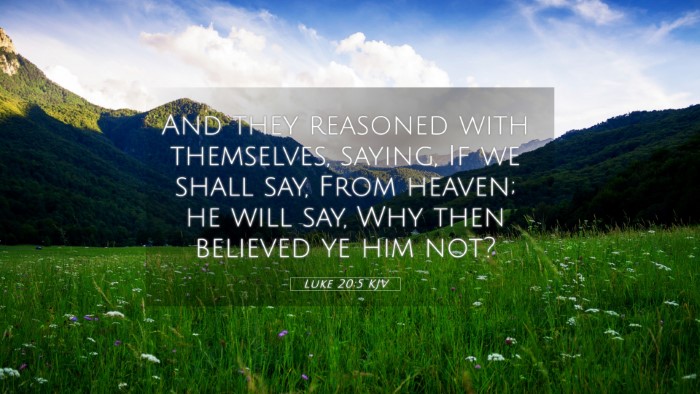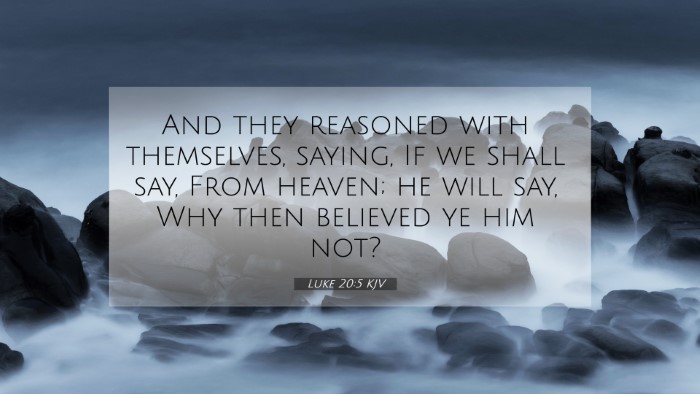Understanding Luke 20:5
Luke 20:5 states: "And they reasoned with themselves, saying, If we shall say, From heaven; he will say, Why then believed ye him not?" This verse takes place in a context where the religious leaders of the time are grappling with Jesus’ authority and the implications of their response to Him.
Contextual Analysis
This verse reflects the intense scrutiny the religious leaders exercised regarding Jesus’ claims and the authority with which He spoke. They are caught in a dilemma, revealing their internal conflict and the political and spiritual stakes involved in their decision-making.
Insights from Public Domain Commentaries
Matthew Henry
- Inner Conflict: Henry points out the futility of their reasoning; they are aware of the truth yet refuse to acknowledge it, showing the corrupt nature of their hearts.
- Divine Authority: Henry emphasizes the consequences of rejecting divine authority, indicating that their reasoning stems from fear and pride.
Albert Barnes
- Question of Authority: Barnes elaborates that the religious leaders’ public perception of Jesus vs. their inner thoughts highlights a deeper issue of recognizing authority from God versus human tradition.
- Implications of Belief: He notes that their logical conclusions lead them to a place of denial that has severe spiritual implications; rejecting Jesus equates to rejecting God's appointed messenger.
Adam Clarke
- Fear of Public Opinion: Clarke highlights that the leaders prioritize public opinion over divine revelation, indicating their inability to stand firmly on truth.
- Calculation of Responses: Their reasoning shows a calculated attempt to manage the consequences of their response to Jesus, reflecting a heart unwilling to submit to divine wisdom.
Cross-Referencing Biblical Texts
To fully grasp the implications of Luke 20:5, we can explore several Bible verse cross-references that illuminate its themes. Here are relevant verses that relate:
- Matthew 21:25 - “The baptism of John, whence was it? From heaven, or of men?” - This reflects a similar dilemma faced by religious leaders.
- John 1:21 - “And they asked him, What then? Art thou Elias? And he saith, I am not. Art thou that prophet? And he answered, No.” - Here, we see a questioning of authority that parallels Luke 20:5.
- Matthew 12:24 - “But when the Pharisees heard it, they said, This fellow doth not cast out devils, but by Beelzebub the prince of the devils.” - This shows the spirit of denial that the leaders embodied.
- Luke 7:30 - “But the Pharisees and lawyers rejected the counsel of God against themselves...” - This highlights their rejection of God’s purpose.
- Mark 11:31 - “And they reasoned with themselves, saying, If we say, From heaven; he will say, Why then did ye not believe him?” - A direct comparison to their reasoning in Luke 20:5.
- Acts 4:16 - “Saying, What shall we do to these men? For that indeed a notable miracle hath been done by them is manifest to all them that dwell in Jerusalem...” - The challenge of accepting truth is reinforced here by the Apostles' experience.
- John 3:19 - “And this is the condemnation, that light is come into the world, and men loved darkness rather than light, because their deeds were evil.” - This verse sheds light on the moral dilemmas faced when confronted with divine truth.
Thematic Connections and Comparative Analysis
In exploring connections between Bible verses, it is essential to grasp the underlying themes presented in Luke 20:5. The notion of authority, the conflict between divine truth and human reasoning, and the fear of consequences for recognizing Jesus’ true nature are prevalent. By examining these dynamics, we can better understand the overarching narrative of scripture where similar conflicts arise.
Tools for Bible Cross-Referencing
Using tools for Bible cross-referencing greatly enhances our understanding of scripture. Here are some methods:
- Bible Concordance: A comprehensive list of Biblical words and verses to help identify themes and topics.
- Bible Cross-Reference Guide: Various compilation books and resources that systematically link related verses.
- Cross-Reference Bible Study: A methodical approach to digging deeper into scripture by following thematic connections.
Conclusion
The reflections in Luke 20:5 serve as a poignant reminder of the consequences of rejecting divine truth. Through cross-referencing and thematic exploration, we gain richer insights into the nature of faith, authority, and the human condition. By understanding the connections between Bible verses and employing various cross-referencing tools, we open ourselves to a deeper comprehension and appreciation of God's Word.









